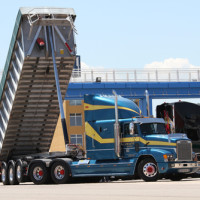Congress Weighs Possible Increase in Tractor-Trailer Carrying Capacity

A change is in the air which would increase the weight limit allowed on commercial vehicles traversing the interstate highway system. Currently, federal regulations limit the weight of a tractor-trailer to 80,000 pounds, but the new rule would allow these trucks to weigh as much as 91,000 pounds. Proponents of the measure argue that the change would increase highway traffic safety. Opponents of the bill are not so sure.
In order to handle the increased load, trucks would be required to install a sixth axle (most semis have five axles currently). With the addition of the sixth axle, the extra weight would be distributed over a greater base, easing the stress a heavier truck would place on roads and bridges. In exchange for upgrading their trucks with the additional axle, shipping companies and manufacturers would be able send more goods in what are otherwise partially-filled trucks that have met their weight limit.
As to the safety issue, advocates for the change cite that more fully-loaded trucks would result in fewer semis overall on the road, which statistically should result in fewer large truck accidents, which are known to cause serious injury or death when tractor-trailers collide with passenger vehicles, which typically weigh only 3,000-5,000 pounds in comparison. Fewer trucks could also mean less greenhouse gas emissions, which would benefit the environment.
On the other hand, some states currently allow heavier, six-axle trucks on their highway systems, and critics of the bill cite Department of Transportation (DOT) research showing a 47% higher crash rate for these heavier vehicles. Also, simple physics shows that a crash involving a heavier truck would be more destructive and dangerous than a similar collision with a lighter semi. These same physics would also imply that a heavier truck would need more stopping distance than a lighter one, but the bill’s sponsor cited research that the braking distance would remain the same or even decrease due to the sixth axle. The DOT research, however, found that the heavier semis were considerably more likely to have brake violations when inspected. In the end, the DOT concluded there was insufficient data to decide whether allowing heavier tractor-trailers would be good or bad for public safety.
The measure, H.R. 3488, was introduced by Wisconsin representative Reid Ribble as an amendment to the surface transportation reauthorization bill (the federal highway bill) and is titled the Safe, Flexible and Efficient Trucking Act, or SAFE Trucking Act. The bill is currently in the Subcommittee on Highways and Transit in the House Transportation and Infrastructure Committee.
If you or a loved one has been injured in a truck accident in central Kentucky, contact the experienced truck accident attorneys at Davis & Haymond, P.S.C., at 859-624-3380 in Richmond or 606-726-9991 in Irvine.






